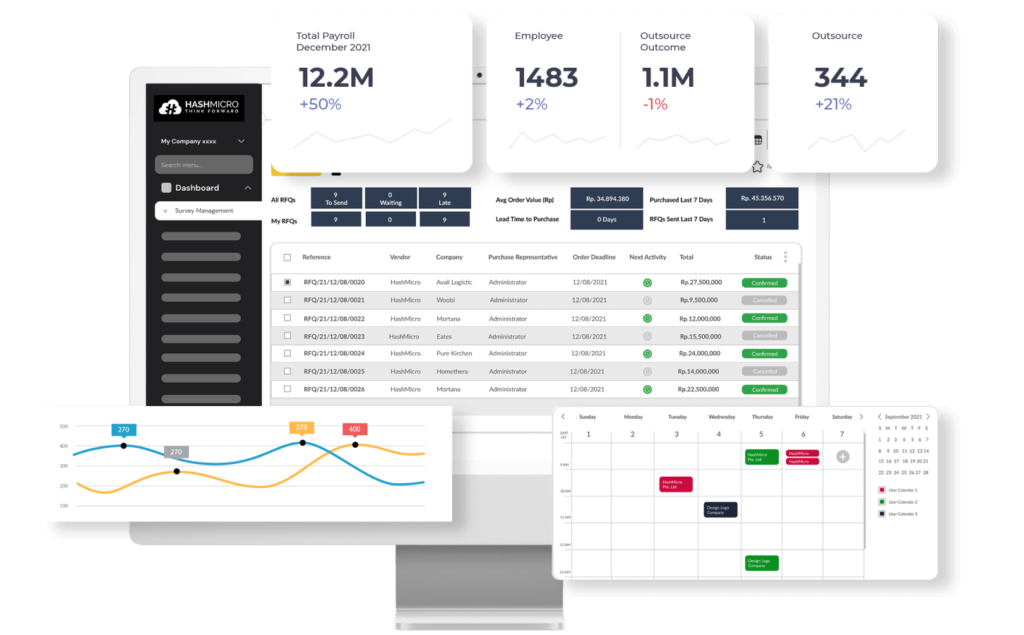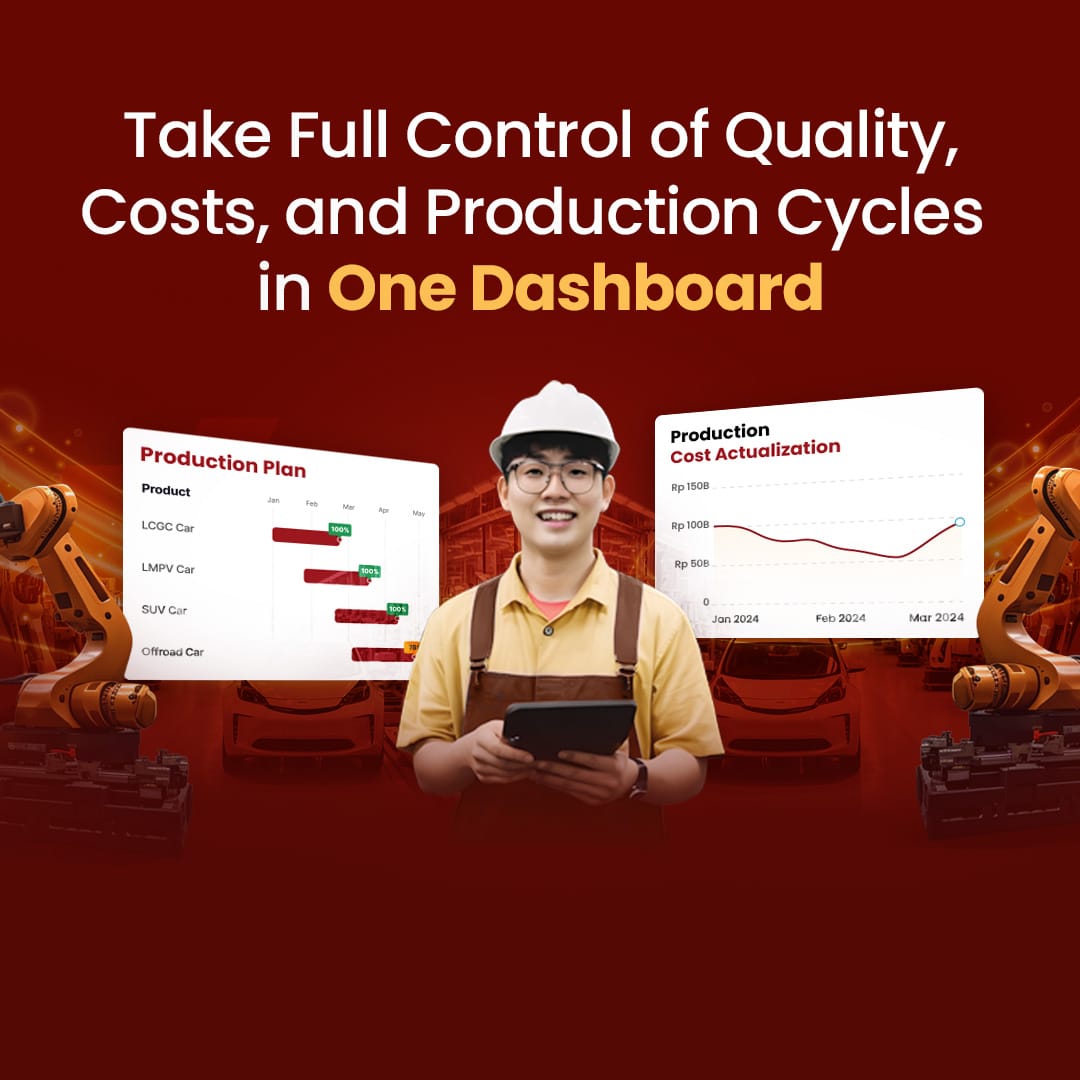As a country aiming to become a leading hub, Singapore implements high standards for its food manufacturing industry. You must adhere to strict food safety and environmental controls, resulting in numerous regulations and licenses that need to be obtained.
However, food manufacturing in Singapore is not without its challenges. From stringent rules and regulations to escalating operational costs, and high demand coupled with competitiveness, there are various issues to overcome. Consequently, you must diligently work to streamline production processes to address these challenges.
One effective strategy to overcome these hurdles is by adopting the best food manufacturing software. This software helps manage compliance with regulations, reduces operational costs, and optimizes production processes to stay competitive in a high-demand market.
In this article, we’ll explore the intricacies of food manufacturing in Singapore, the challenges you face, and the strategies you can implement to overcome them, including the use of top food manufacturing software.
Table of Content:
Table of Content
Key Takeaways
|
Overview of Food Manufacturing in Singapore
The food manufacturing industry in Singapore is diverse, consisting of 10 sub-sectors: confectionery, dairy, edible oils and spices, sauces, noodles, seafood, cooked food, bakery, meat, and beverages. It also involves a wide spectrum of activities, such as sourcing the ingredients, processing the raw ingredients into finished products, and selling and distributing them.
Singapore is also very keen on becoming a top player in the world’s food manufacturing industry. It aims to develop the industry into the leading food and nutrition hub in Asia, with a highlight on globally competitive food companies. As a result, the food manufacturers keep up with researching and developing new products, as well as improving the old ones.
The Singapore Food Agency (SFA) is responsible for ensuring consistent food security in the country. It serves as the judge, jury, and executioner in the food manufacturing industry. Its duties include establishing regulations, conducting public outreach to both the community and companies, as well as inspections to ensure that companies comply with the law.
One of the most crucial ways to improve their competitiveness is by digitizing each process, enabling operations to be more streamlined and resources to be optimized. Moreover, going digital also allows companies to better connect with the international economic ecosystem. It serves the purpose of making businesses more intelligent and operations more autonomous.
Importance of Efficiency in Food Manufacturing
The reliance of Singapore’s food manufacturing sector on efficiency is a critical aspect to consider. It is undeniable that Singapore imports over 90% of its food due to the limited availability of arable land within its territory. Consequently, ensuring food security emerges as one of the foremost priorities for the nation, given its dependency on external sources for sustenance.
However, it is important to note that Singapore has undertaken proactive measures to reduce its dependency on foreign nations by fostering domestic and international food production. Additionally, Singapore makes concerted efforts towards innovating alternative and sustainable food products.
In Singapore, a nation known for its commitment to innovation and efficiency, minimizing time spent on administrative tasks is paramount. This is particularly crucial in the food manufacturing industry, where streamlined processes are essential for maximizing productivity and maintaining competitiveness.
By ensuring that administrative burdens are minimized, resources can be allocated more effectively toward innovation, research, and development efforts. An efficient food manufacturing sector not only enhances productivity and profitability but also reinforces Singapore’s reputation as a dynamic and forward-thinking hub for food production.
Furthermore, by optimizing processes, minimizing energy consumption, and implementing sustainable practices such as waste reduction and recycling, the food manufacturing industry can contribute to Singapore’s efforts towards building a more sustainable and resilient food system.
Challenges in Singapore’s Food Manufacturing
As a nation that prioritizes food safety above all else, Singapore adheres to a set of strict regulations governing food production. In addition to ensuring food safety and complying with regulations, other challenges impacting food production include energy crises, escalating operational expenses, heightened market competition, and the imperative of maintaining stringent quality control measures.
Here are the challenges food manufacturers frequently encounter:
Strict regulations
Food regulations are a significant challenge within the food manufacturing industry, exerting an important influence on environmental protection and food safety. Compliance with these regulations poses a formidable task for many companies, necessitating substantial upgrades to their operations as instructed.
Escalating operating cost
The ongoing emphasis on sustainability pushes businesses to invest in eco-friendly practices and materials. In addition, the pandemic introduced another layer of complexity related to health and safety regulations. Supply chain disruptions and volatile commodity prices have increased ingredients, packaging, and transportation costs.
Intense competitiveness
The current trend in the Singaporean market is moving towards sustainable, environmentally friendly, and healthy food products. As the demand for these items increases, food companies are actively striving to meet these needs. They are competing with one another to increase production, innovate to create eco-friendly products, and simultaneously compete with other companies in the market.
Quality control
It is also another significant challenge for the food manufacturing industry, as the companies must comply with food safety regulations. They also have to make sure that the product quality is consistent, which might be hard due to the usage of raw materials that are seasonal and/or not consistent in quality.
Innovative Approaches in Food Manufacturing Operations
Applying innovative approaches in food manufacturing operations is essential to ensuring that the companies remain competitive in the developing market. It is also crucial to address the challenges, such as high demand, quality control, and strict regulations, as well as gain profitability in the long run.
How can food manufacturing operations achieve both effectiveness and profitability while maintaining compliance with regulations? Below are five strategies that can be applied.
Prioritize food safety in the facility
The most important consideration for your strategy is producing food products that are safe to consume. Once a misstep occurs, all of your efforts will go down the drain, putting your business at risk. Therefore, it is essential to align the food safety strategy with the overall production strategy.
The first step to implementing food safety is to ensure that allergens and pathogens don’t enter the final products. You also need to guarantee that cross-contamination is avoided throughout the production line. Achieving this involves adhering to optimal standards in designing sanitary and hygienic facilities.
Segregating the production of allergen-containing versions of the same food ensures that cross-contamination will not occur. Consider a smaller facility designed for adaptable manufacturing. When various products are manufactured in a single open production area, the main way to prevent contamination is through thorough cleaning and scheduling.
Alternatively, allergen-containing flavors could be produced in separate areas, each equipped with dedicated HVAC systems and employee entry points. This aspect should be taken into account during the facility’s design phase. For example, by housing batching and bagging systems in their own production spaces, a company can simultaneously produce wheat flour and gluten-free snack foods like crackers or pretzels within the same facility.
Develop a production strategy
It is imperative to formulate a strategic plan spanning at least five years of operations. This plan should encompass various aspects such as market analysis, product development, sales and marketing strategies, operational expansion, and financial forecasts.
By having clear objectives and milestones for the foreseeable future, the company can effectively navigate market dynamics and adapt to changing consumer preferences.
Efficiency plays a pivotal role in the realm of food manufacturing, requiring continuous efforts to enhance workflow. This entails scrutinizing existing processes, pinpointing bottlenecks or areas for improvement, and implementing targeted measures to streamline operations.
By fostering a culture of ongoing improvement and innovation, the company can bolster operational efficiency, agility, and competitiveness in the dynamic food manufacturing landscape.
Automate manufacturing process
Your production approach should prioritize financial stability. One of the most effective ways to achieve financial stability is through investing in automated machines.
Some companies, particularly larger manufacturers with greater access to capital, prioritize investing more capital expenditure to yield operational expenditure savings in the long run. This involves the stages of design, construction, and equipment acquisition, particularly through the adoption of appropriate levels of automation.
Assessing how equipment will be integrated is crucial to ensure compatibility with your facility. Additionally, understanding your staffing strategy and operational philosophy is essential for determining the appropriate degree of automation.
One way to automate the manufacturing process is to use manufacturing software. With manufacturing software, you can streamline work processes, which will certainly reduce costs. In addition, manufacturing software also helps in end-to-end traceability, which ensures that food products are produced while meeting applicable standards.
Balance capital budgets with product margins
Prioritize capital investments based on their potential to positively impact product margins. Focus on projects that offer the greatest opportunity for cost savings, revenue growth, or margin improvement.
In managing the capital budget in food manufacturing, it is crucial to assess the risks tied to each investment and create backup plans to handle potential obstacles. This evaluation should encompass various factors like market fluctuations, shifts in regulations, and the possibility of technology becoming outdated.
Moreover, ongoing monitoring of the performance of capital investments is essential. By consistently examining financial statements, operational data, and customer feedback, businesses can gauge the effectiveness of their investments and adapt strategies accordingly to ensure optimal product margins.
Optimize supply chain
The supply chain is one of the essential factors in food manufacturing. A good supply chain keeps your production running smoothly. Two aspects are particularly important to be optimized, namely inventory and transportation.
One of the main goals of food manufacturing is to reduce waste and maximize the utility of every material. To achieve this, the companies must improve their inventory management. They need to be able to accurately forecast demand so that they can predict how much to purchase, how long to store materials, and how much to produce.
The food manufacturing companies will also benefit from improving their transportation and distribution processes. They can focus on optimizing logistics and transportation routes. By carefully planning routes and schedules, companies can minimize transportation costs and reduce lead times.
Businesses should also prioritize enhancing order processing and fulfillment accuracy and efficiency. Streamlined systems and procedures ensure prompt delivery of products to customers in optimal condition, boosting satisfaction and operational efficiency.
Core Modules in Food Manufacturing Operations
As previously explained, efficiency stands as the linchpin in the operation of a sustainable, competitive, and thriving food manufacturing industry. Moreover, we have gained insight into the numerous challenges that food manufacturers often face. Consequently, all of the explanations point in one direction: enterprises must inevitably embrace digitalization to maximize their potential.
Therefore, food manufacturers should look into implementing systems that streamline their tasks, enabling them to capitalize on benefits while effectively addressing challenges. These are the benefits of using systems:
- Reducing wastage through streamlined sourcing and production processes involves implementing efficient systems for sourcing raw materials and managing production workflows.
- Improving traceability and accountability through implementing robust tracking and monitoring systems throughout the supply chain. This allows food manufacturers to trace the journey of ingredients from farm to fork, ensuring compliance with regulations and quality standards
- Automating procedures to reduce human error and labor-intensive tasks. By automating repetitive tasks and implementing quality assurance measures, food manufacturers can minimize the risk of errors, improve efficiency, and free up employees to focus on more value-added activities.
- Providing real-time data insights to optimize operations involves leveraging data analytics and IoT (Internet of Things) technologies to collect and analyze data from various sources in real time. This allows food manufacturers to gain actionable insights, enabling them to make data-driven decisions to optimize processes, improve product quality, and enhance overall operational efficiency.
Additionally, the food manufacturing industry will benefit much more from using a system known as Enterprise Resource Planning (ERP). It is not just about production; other essential systems must be in place. For instance, there are systems for sales, inventory management, accounting, and so on.
Furthermore, these systems must be seamlessly integrated to prevent data conflicts and enable real-time reporting. This way, companies can make informed decisions based on up-to-date information. Below are reasons why food manufacturing companies should use ERP software:
Easy quality control with accurate data
To enhance operational efficiency, it is essential to minimize manual checks and promptly address any necessary rectifications. By automating routine tasks and implementing proactive monitoring systems, companies can streamline their operations and reduce the risk of errors or delays.
Moreover, automating the record-keeping process for key parameters is crucial for ensuring compliance with safety standards. By leveraging technology to systematically record and track essential data points, food manufacturers can maintain comprehensive documentation and demonstrate adherence to regulatory requirements.
Additionally, analyzing the data collected from automated systems provides valuable insights for improving productivity and enhancing the quality of food products. By leveraging data analytics tools, companies can identify trends, pinpoint areas for optimization, and make informed decisions to drive continuous improvement in their operations.
Avoid food waste with inventory management
Inventory management can give alerts regarding expiring stocks. By promptly identifying items nearing expiration, companies can prevent wastage and mitigate risks associated with expired products effectively. This ensures that resources are utilized efficiently and potential losses are minimized.
Additionally, staying informed about expiring stocks helps prevent overstocking, which can lead to unnecessary waste and increased storage costs. Optimizing inventory based on forecasts and expiry dates minimizes excess stock, maximizing storage and reducing financial burden.
Furthermore, optimizing storage space and reducing inventory costs are key objectives for any food manufacturing operation. By leveraging technology to monitor stock levels and expiration dates, companies can maximize the utilization of available storage space while minimizing the risk of product obsolescence. This not only helps improve operational efficiency but also enhances profitability by minimizing unnecessary inventory holding costs.
Seamless sales tracking
Effectively tracking and managing sales is essential for seizing new business opportunities. By staying informed about market trends and customer preferences, companies can identify potential leads and tailor their sales strategies accordingly. This enables them to capitalize on emerging opportunities and expand their customer base.
Seamlessly converting customers’ purchase orders into sales orders is crucial for ensuring a smooth and efficient sales process. By automating this transition, companies can eliminate delays and errors associated with manual data entry, leading to faster order processing and enhanced customer satisfaction.
Furthermore, eliminating human errors inherent in manual and paper-based processes is the key to maintaining accuracy and reliability in sales operations. Digitizing and automating processes minimizes errors like data entry mistakes, improving efficiency and accuracy in company operations.
This not only improves the quality of sales transactions but also reduces the time and resources required for error correction, resulting in a more efficient and cost-effective sales workflow.
Boost productivity using reliable workforce management
Improving workforce productivity is a key priority for any business. Implementing strategies for streamlined workflows, training, and positive work environments boosts company efficiency and output effectively. This includes identifying and addressing any barriers to productivity, such as outdated processes or insufficient resources, and implementing solutions to overcome them.
Additionally, collecting data and monitoring staff attendance easily can help companies optimize their workforce management practices. By leveraging technology such as time-tracking software or biometric systems, companies can accurately record employee attendance, track work hours, and identify trends or patterns.
Furthermore, planning workers’ schedules easily is essential for ensuring smooth operations and meeting production targets. By using scheduling software, companies can create flexible schedules that consider employee preferences, skill levels, and workload requirements. This allows for better coordination of tasks, improved employee satisfaction, and enhanced overall productivity.
HashMicro provides an ERP software solution designed to fulfill the diverse requirements of food manufacturers. With comprehensive modules encompassing inventory management, employee management, and beyond, our software empowers companies to effectively oversee their operations.
Moreover, our integrated modules facilitate seamless communication and data sharing. In addition to offering real-time reporting capabilities across modules, our software harnesses data analysis to provide market forecasts. This enables companies to make informed business decisions and streamline their production and inventory management processes with ease.
Conclusion
HashMicro’s ERP software stands as the best solution for enterprises, including food manufacturers, who seek to elevate their business operations while staying up-to-date with industry developments. Our comprehensive ERP suite offers a wide range of features tailored to meet the unique needs of modern businesses. This will ensure seamless integration and efficiency across all facets of operations.
With HashMicro’s ERP software, enterprises gain access to cutting-edge technology designed to optimize productivity, enhance decision-making processes, and drive sustainable growth.
From inventory management to customer relationship management, our solution empowers businesses to streamline workflows, improve resource allocation, and adapt swiftly to market dynamics.
Transform your enterprise with HashMicro’s ERP software for unparalleled success in the dynamic food manufacturing industry. If you are interested in knowing more, you can try our free demo or contact our team.








































